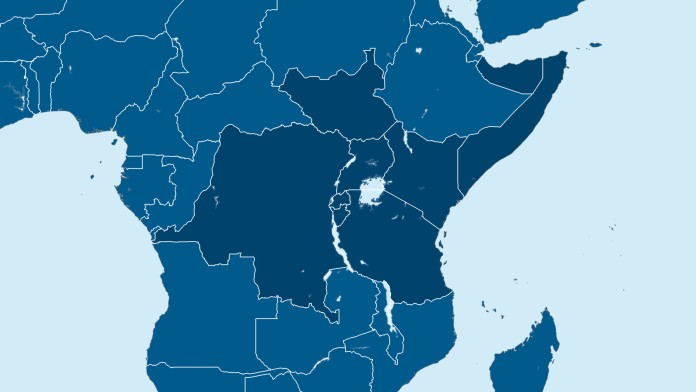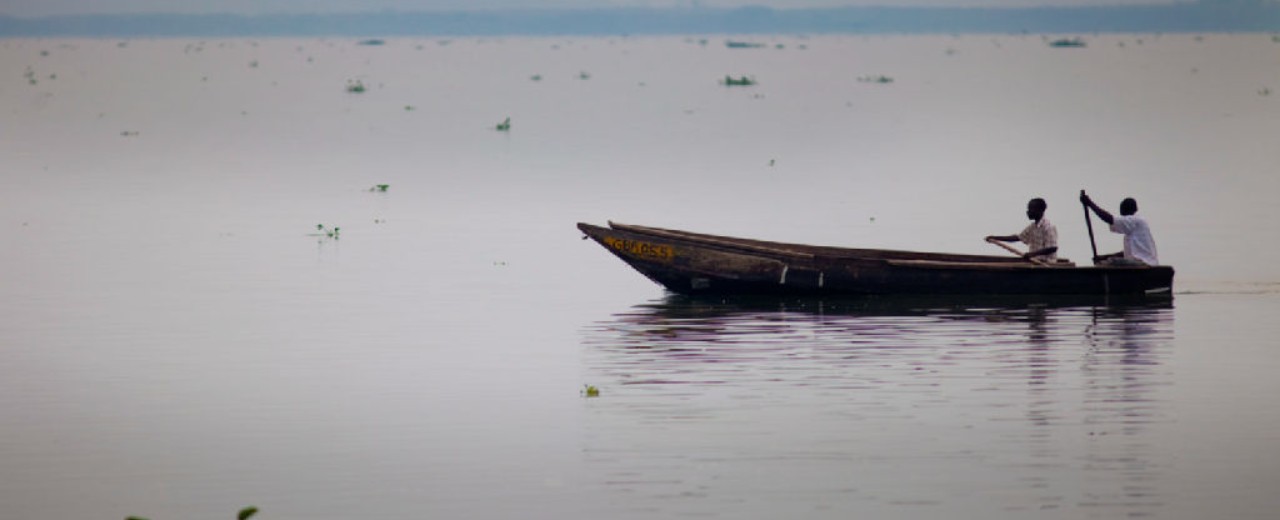
As of: 01/2024
Lake Victoria supplies people and the economy not only with water, but also with energy and food. At the same time, it is an anchor of regional integration. However, the lake is at risk; population growth and economic development are leading to increasing water demand. Competition for the use of the lake is increasing, as is climate change.
On behalf of the German Federal Government, KfW is working with the EU to support the regional Lake Victoria Basin Commission (LVBC) of the East African Community (EAC) in the long-term management of Lake Victoria basin’s catchment area. To this end, KfW and the EU are strengthening the Commission’s capacities for cross-border integrated water resource management (IWRM) and promoting the construction of infrastructure for waste water disposal. In the future, the aim is to create a common, cross-border set of rules that will secure the long-term use of Lake Victoria.
Lake Victoria, the second largest inland body of water in the world, has several benefits for its five neighbouring states of Burundi, Kenya, Rwanda, Tanzania and Uganda. It serves as an energy source and transport route; supplies water for the population, ecosystems and the economy of the region; cushions the adverse effects of climate change and is a hotspot for biodiversity.
Politically, Lake Victoria plays an important role in regional integration. It can be a resource for peace and stability in a region affected by conflict.
But the lake is often threatened. Progressive degradation of wetlands and deforestation in the cross-border catchment basin lead to a loss of environmental diversity. The release of pollutants, untreated wastewater from industry and agriculture and overfishing endanger the ecological balance of the lake. This is accelerated by rapid urbanisation and population growth, as well as the dynamic economic development that is causing increased demand for water. Climate change further exacerbates these challenges. All this leads to increased competition for the use of the lake.

KfW and the EU are providing almost EUR 40 million to assist the EAC in the regional management of Lake Victoria and its catchment basin. The executing agency is the Lake Victoria Basin Commission (LVBC), which was founded in 2003. At national level, the respective water authorities or ministries are responsible for implementing the investments in infrastructure supported by the donors.
The programme aims to ensure integrated management of Lake Victoria’s cross-border water resources. This means coordinating competing water needs and uses of the lake. Relevant actors from agriculture, industry, fisheries and the population are involved in the reconciliation of interests.
The programme promoted by KfW finances outputs that enhance LVBC’s capacities so that it can better fulfil its role as a long-term, strategic institution for regional water management, for example by establishing transnational objectives and monitoring concepts for water.
At the same time, investments are being made in the infrastructure for the disposal of wastewater, which immediately improves the water quality of Lake Victoria. Initially, the cities of Kigali, Kampala, Mwanza and Kisumu in the lake’s catchment basin will be supported. These rapid and vital investments provide an incentive for the neighbouring countries to work more closely together. They should stand as an example and bring about further investments in order to achieve the objectives for the body of water.
Together, the neighbouring countries are striving to secure the long-term coordinated and sustainable use of the lake through a common, regional set of rules and a strong LVBC. The successful model of the European Water Framework Directive serves as a guide.
The sustainable use of Lake Victoria secures the water supply and food supply for around 40 million people living in the lake’s catchment basin. Preserving the ecosystem enhances the region’s resilience to the effects of climate change, such as droughts and heat waves. Improving the water quality of the lake is a prerequisite for preserving biodiversity.
Diseases caused by polluted water will decrease, people will be healthier and be able to generate more income. The project is improving the living conditions of women and children, in particular. They benefit from better sanitation and optimised water quality in Lake Victoria, as they are the ones who usually have to procure the water and care for sick relatives. It is expected that women will be able to spend more time on productive, income-generating activities thanks to improved sanitation and reduced water pollution. Infants and babies will suffer less from water-borne diseases due to improved sanitation.
Integrated management of Lake Victoria also contributes to deepening the cross-border integration of neighbouring countries and thereby reduces the risk of conflicts in the region.
The project contributes to the achievement of these following United Nations Sustainable Development Goals:
KfW Group
KfW Development Bank
Governance/Stabilisation & Water East Africa
KfW Office Dar es Salaam
Share page
To share the content of this page with your network, click on one of the icons below.
Note on data protection: When you share content, your personal data is transferred to the selected network.
Data protection
Alternatively, you can also copy the short link: https://www.kfw-entwicklungsbank.de/s/enzBY1RV
Copy link Link copied